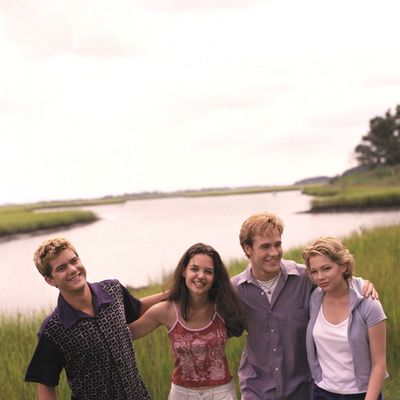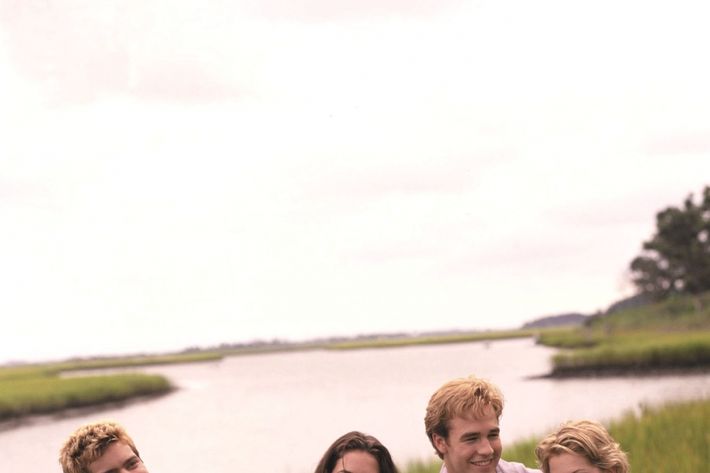

The Nostalgia Fact-Check is a recurring Vulture feature in which we revisit a seminal movie, TV show, or album that reflexively evinces an “Oh my God, that was the best ever!” response by a certain demographic, owing to it having been imprinted on them early. Now, years later, we will take a look at these classics in a more objective, unforgiving adult light: Are they really the best ever? How do they hold up now? We’ve already reconsidered a number of once beloved entertainments. Next up: Dawson’s Creek.
Background: The pleasingly meta Scream franchise breathed new life into the horror-film genre in the mid-nineties and let boy-wonder creator Kevin Williamson write his own ticket. The destination he chose: an equally self-aware teen drama about hopeless romantic and cineaste Dawson Leery (James Van Der Beek), his best friends “Little” Joey Potter (Katie Holmes) and Pacey Witter (Joshua Jackson), and the new girl with the dark New York City past, Jen Lindley (Michelle Williams), living, laughing, and loving in small-town Cape Cod. And blathering about it endlessly to various tertiary characters and to one another. When Dawson’s began, in 1998, it was one of the then-fledgling WB’s flagship shows, accruing buzz and acclaim (all relative) for the newbie network.
Nostalgia Demo: Late-nineties/early-aughts teens; telephiles who loved (or loved to hate) the almost exclusively adolescent-oriented programming on the late and only occasionally lamented WB; those who did not have to write about the show for a living.
Nostalgia Fact-Check: Full disclosure: I co-founded Television Without Pity, which began its life as Dawson’s Wrap, a site devoted to recapping Dawson’s — i.e., cataloguing its many offenses against quality entertainment, including sexism, excessive self-regard, inattentive styling of the female leads, estrangement from realistic dialogue (and Cape geography), and … Dawson himself. The show bowed in January of 1998 amid a flurry of “negative” publicity surrounding its allegedly racy first-season plots, but my co-founder Tara Ariano and I didn’t find the show offensive because Pacey slept with a teacher; rather, it shot for My So-Called Life, a show we revered, and missed it by a nautical mile. (Our other co-founder, David T. Cole, wisely avoided having an opinion one way or the other.)
In other words, if I’ve ever regarded Dawson’s Creek fondly, it’s as a keystone of my career, not on its own debatable merits … but then, any residual loathing of the show comes from the same place, and I won’t lie: I never liked the show. So, my initial response to the question of whether the show holds up was naturally a flippant “God, I hope not.” The real answer is more like yes … and no.
The show is actually much more bearable than I’d remembered — starting, to my delight, with the leading man. This may stem in part from Van Der Beek’s demonstrated willingness to send himself up since before the show even ended, starting with a vintage Saturday Night Live sketch in which the Beek plays a Cats chorus member giving his parents a backstage tour, and continuing through Jay and Silent Bob Strike Back and the “Asshole for Hire” and “Vandermemes” spots for Funny or Die. Whatever the reason, the Dawson I recall from the show’s initial run — by turns overbearing, creepy, smug, pathetic, and condescending; sporting consistently dreadful hair that tried and failed to mask that notoriously sizable forehead — reads now as a fairly typical adolescent try-hard with only-child syndrome who thinks he knows everything. Don’t get me wrong, he’s still a tremendouche, and it’s an egregious misread by Kevin Williamson of the difference between “relatable semi-autobiographical flaws” and “contrived, unsympathetic obsessions expressed via amateurish nostril-flaring.” The scene in which a drunk and bitter Dawson is whomped face-first into his own birthday cake by Joey is still very enjoyable. But I used to find Dawson really hateful, and he’s not. He’s merely annoying.
And the show’s acting is, under the circumstances, amazing. The Beek is the most limited actor of the main cast, and had difficulty retailing his character’s pompous-virgin sermonizing as relatable — but characters big and small had to digest huge bouquets of raw SAT-prep kale and make it believable, and for the most part, they did a fantastic job. The third-season prom episode is a great example: Pacey’s rationale for dumping Joey is preposterously contrived, but Joshua Jackson and Katie Holmes almost let the audience believe it.
Michelle Williams, probably the top thespian of the bunch with two Oscar noms, gets off to a rocky start as Jen Lindley, the troubled tramp from the big city. In many of her big second-season scenes, Williams has “squinting” and/or “whining” confused with “acting.” In her defense, though, better blocking would have helped her — we’re repeatedly told via slut-shaming dialogue that Jen is a seductress or a “barracuda,” but she walks like she’s been on horseback for three days, in concrete panties — and the writers never did quite figure out what to do with the character, sending Jen on a series of downward-spiral arcs that landed like wet toilet paper. And you can see glimmers of Williams’s potential, even in the dumber material (Jen’s unspeakable dark secret, so terrible that she blocked it out, is that she … saw her father macking on the babysitter? Girl, please).
And talk about a millennial time capsule: the cordless phones and answering machines; the cropped tank tops and lavender butterfly barrettes; the faux ska on the soundtrack! Dawson and Pacey work at a video store! Watching the credits for future stars (and has-beens and never-weres) is fun, too. Eric Balfour spreads rumors that he and Joey Did It! Jane Lynch is Pacey’s mom! Remember Rachael Leigh Cook? Me neither — but she’s in Dawson’s movie-within-the-show! (Well, one of his movies-within-the-show. Sigh. Shut up, Dawson.) Here’s Brittany Daniel, a now-forgotten next big thing, as snotty stripper/Jen’s half-sister Eve! Madchen Amick as Dawson’s wonderfully rude film teacher, Jeremy Sisto as Joey’s finale boyfriend, Oliver Hudson as zzzz … well, you can’t win them all. You can, however, enjoy the historical weirdness of how the show cast Helen Lindley, Jen’s mom. The first time she appears, she’s played by Mel Harris, a.k.a. Hope from thirtysomething. Later, she’s played by Mimi Rogers, a.k.a. the first Mrs. Tom Cruise. Go figure.
Alas, casting trivia is often the only interesting thing going on. The dialogue is risible from the very first scene of the pilot — “mounting sexual theoretics,” for the love of Mike — and never really improves, realism-wise. Now and then, someone gets a good line off: At one point, Joey invites Jen to an “ice-cream anti-social” with a gallon of cookie-dough and two spoons; later, Pacey stands in for the audience by announcing, “No offense, Dawson, but I don’t think anybody cares.”
Most of the time, though, it’s dreary, cry-voice philosophizing about love triangles, cynicism, and soul mates — a word Dawson’s Creek ruined for all time, by the way. It’s Jen whinging, “I’m 16 years old; look what I’ve become.” It’s Joey, who began the series as a salty, angry girl who took a detention for cold-decking a jock skeeze with her cafeteria tray, morphing into a simpy, passive-aggressive catalogue model buffeted by the currents of men’s approval. Williamson front-loaded the first season with plot — Pacey boinks his teacher; Dawson’s mom has an affair with her co-anchor; Joey’s sister goes into labor — but after that, the story arcs consisted of the continental-drift orbits of Joey and Dawson toward and away from one another, with only endless, pretentious, overwritten, pointedly parallel paragraphs about Casablanca and The Last Picture Show, or Jen’s latest boozy bender, in between. True, on a show about high schoolers, the writers’ room can only get away with so much actual sex and must confine themselves to monologues on the subject, but it’s possible to write a balanced prime-time drama about teenagers and how they relate to each other that doesn’t rely too heavily on soap operatics (MSCL, Freaks & Geeks, old-school Degrassi). It’s also possible to go full soap with it and make it fun (90210 old and new, The O.C.).
If the DC creative team usually seemed oblivious to what worked for the show and what didn’t, you’ve got to give them credit for one major course correction: putting Joey and Pacey together. In the beginning, I rooted for Joey and Dawson to become a couple; he was a doofus, but she liked him, and I rooted for her. But Dawson/Joey had no sizzle, no pop; it was all intellect, brooding resentment, and oversize sweater vests, and they kissed like siblings. Whoever saw the chemistry between Holmes and Jackson — who dated briefly in real life, and I wonder what that red-carpet chit-chat is like nowadays — and insisted on following it up basically saved the show. They made a good-looking couple, and they stuck it to Dawson. Of course, that was a mixed blessing, too, as Joey then ping-ponged among Pacey, Dawson, and half a dozen other wet ends for years, but the writers saw that they had to make Pacey/Joey happen — and (spoiler) ultimately end the series with it, lest their next gigs involve fleeing from torches and pitchforks.
Dawson’s Creek couldn’t decide what it wanted to be — a serious, indie-toned look at media-aware American teens; or a scandalous, soapy thrill ride. In the end, it’s neither. It has its moments, but in the final (over-)analysis, not much happens, and what does happen is predictable, or contrived, or takes forever, or all of the above. The scenes that ring the truest after a decade are the ones between friends, but Dawson’s never realized that about itself. When Jen and Joey head to Manhattan so that Jen can confront her past, Jen is acting weird, and Joey worries aloud that “we’re not gonna see you again” — the realest moment in the entire manufactured subplot, one that reflects a reality, namely that the high-school experience is defined by friendships far more than by some retro-engineered fairy-tale conception of soul mates.
So, should you go on a Dawson’s Creek catch-up binge? Sure, go for it. You’ll find a bunch of unexpectedly sweet or powerful moments (and cute boys, if you like that sort of thing — David Monahan as Tobey, Jack’s militant prom date, is a fave of mine). You’ll also find a metric ton of self-referential and/or saccharine bloviating, during which you can feel yourself aging, so keep a finger on the FF button — and skip the bulk of the post-Capeside episodes. Sending characters to college seldom works out, and didn’t for Dawson’s. Jumping straight from graduation to the two-part finale is advised.

